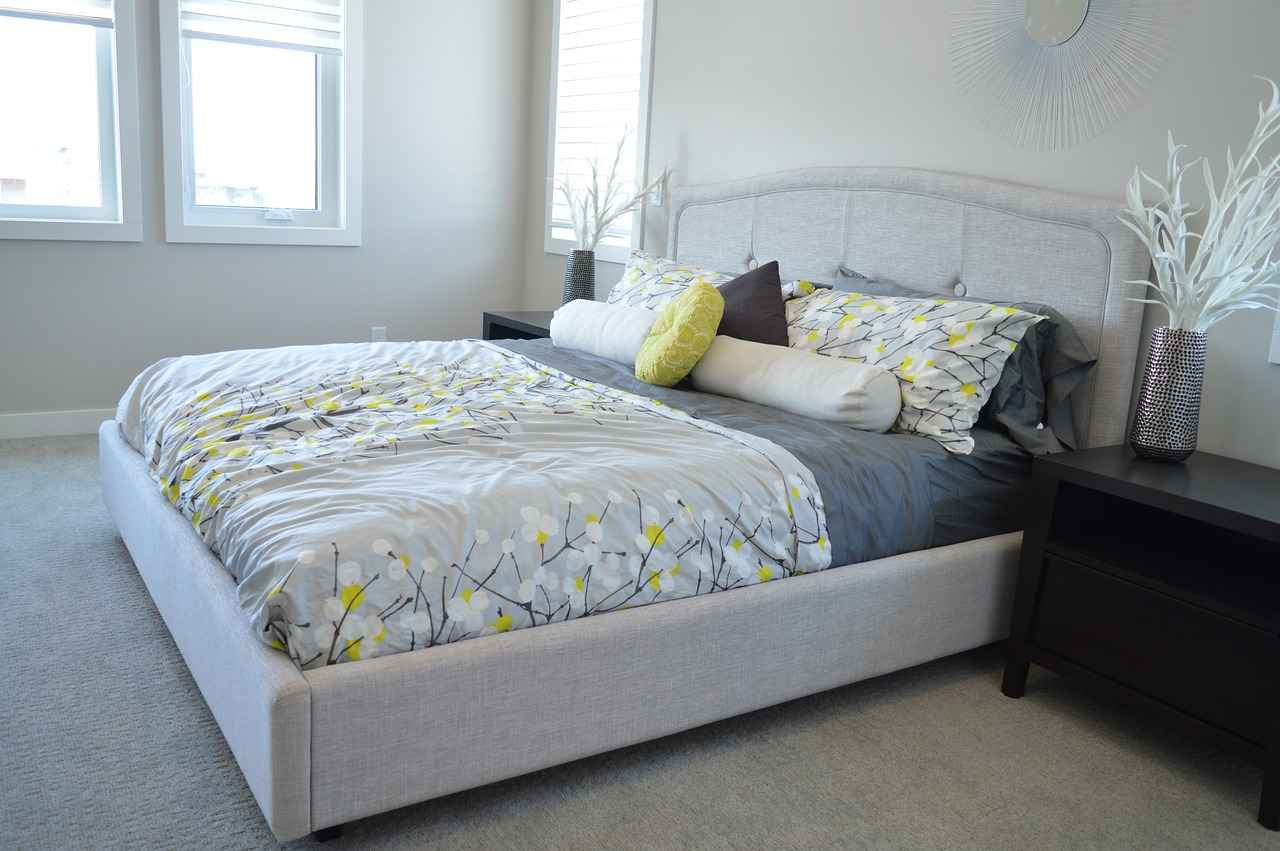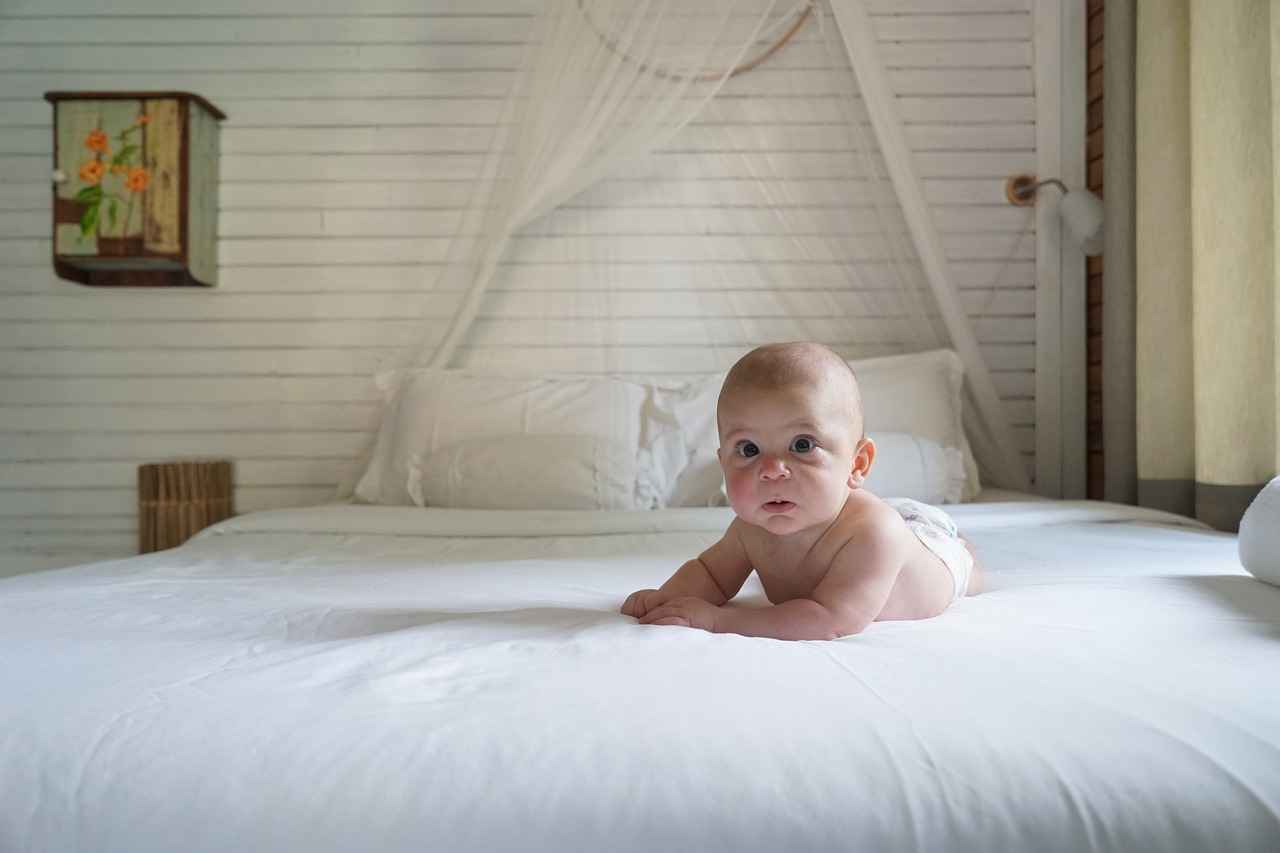This article explores the fascinating evolution of bed design, highlighting key trends and innovations that have shaped how we sleep over the years.
Over the centuries, bed design has undergone significant transformations, reflecting changes in culture, technology, and lifestyle. From the primitive sleeping arrangements of our ancestors to the sophisticated designs we see today, each era has contributed to the way we experience rest.
- The Origins of Bed Design: The journey begins with the earliest forms of beds, which were essentially raised platforms made from natural materials. These simple structures provided a more comfortable and hygienic sleeping surface compared to the ground.
- Medieval Bed Designs: During the medieval period, beds became a status symbol. The introduction of canopies and intricate carvings marked a shift towards more ornate designs, showcasing wealth and craftsmanship.
- The Four-Poster Bed: This iconic design emerged as a hallmark of luxury, featuring tall posts that supported a canopy. It was not just a bed but a statement piece in noble households.
- Materials Used in Medieval Beds: Wood, textiles, and metals were commonly utilized, affecting both durability and aesthetics. The choice of materials often reflected the owner’s social standing.
- Functionality and Design: Medieval beds were multifunctional, often serving as seating areas and storage spaces, highlighting their importance in daily life.
- Renaissance Influences on Bed Design: The Renaissance revived classical aesthetics, leading to beds adorned with intricate details and artistic craftsmanship that emphasized beauty and comfort.
- Industrial Revolution and Its Impact: The Industrial Revolution revolutionized bed design with mass production techniques, making stylish beds accessible to the masses.
- Adjustable Beds and Innovations: The 19th century saw the introduction of adjustable beds, enhancing comfort and catering to various needs.
- Modern Minimalist Trends: The 20th century brought a focus on simplicity and functionality, with designs that integrated technology for improved sleep experiences.
- Eco-Friendly Bed Designs: Today, sustainability is a key consideration, with an emphasis on using organic materials and environmentally responsible practices in bed construction.
- Innovative Sleep Technologies: Modern advancements include smart mattresses and integrated sleep monitoring systems, revolutionizing how we approach sleep health.
- The Future of Bed Design: Looking ahead, we can expect further innovations driven by technology, sustainability, and changing consumer preferences, shaping the future of how we sleep.
In conclusion, the evolution of bed design is a testament to human creativity and adaptability. As we continue to innovate and prioritize comfort, the bed remains a central element in our quest for quality sleep.

The Origins of Bed Design
is a captivating journey that traces the evolution of sleeping arrangements from their primitive roots to the sophisticated structures we see today. Early humans relied on natural elements for rest, often utilizing animal skins and leaves to create makeshift beds on the ground. These rudimentary sleeping spaces offered little in terms of comfort and protection from the elements.
As civilizations advanced, so did the concept of sleeping arrangements. The ancient Egyptians, for instance, are credited with developing the first elevated beds made from wood, which provided a more comfortable and hygienic sleeping surface. These beds were often adorned with intricate carvings and were a sign of wealth and status.
In ancient Greece and Rome, beds became more elaborate, featuring mattresses filled with feathers or straw and sophisticated bed frames. The Greeks introduced the klismos, a chair-like design that influenced bed aesthetics, while the Romans favored opulent designs with rich textiles and decorative elements.
During the Middle Ages, bed design took on new significance as beds became a symbol of social status. The introduction of canopies not only added a touch of elegance but also provided warmth and privacy. Beds were often the focal point of a room, showcasing the owner’s wealth through ornate carvings and luxurious fabrics.
As we moved into the Renaissance period, the emphasis on artistry and craftsmanship in bed design became prominent. Beds featured intricate details and were often customized to reflect personal tastes, further elevating their status in homes.
In summary, the origins of bed design highlight a fascinating evolution influenced by culture, social status, and advancements in materials and craftsmanship. From primitive sleeping arrangements to the ornate beds of ancient civilizations, the journey of bed design is a testament to human ingenuity and the quest for comfort.

Medieval Bed Designs
were not merely functional pieces of furniture; they were significant symbols of social status and wealth. During the medieval period, which spanned from the 5th to the late 15th century, the design of beds evolved dramatically, reflecting the cultural and artistic trends of the time.
One of the most distinctive features of medieval beds was the use of canopies. These canopies were often elaborately decorated and served multiple purposes: they provided warmth, privacy, and protection from insects. The canopy was typically supported by posts, creating a grand and imposing structure that elevated the bed’s status as a central piece in the room.
Ornate carvings were another hallmark of medieval bed design. Craftsmen showcased their skills through intricate designs that adorned the bed’s frame and headboard. Common motifs included mythological creatures, floral patterns, and religious symbols, which not only added beauty but also conveyed the owner’s beliefs and values. The craftsmanship reflected the artisanal dedication of the time, making each bed a unique work of art.
Furthermore, the significance of beds in medieval society extended beyond aesthetics. Beds were often used as a place for social gatherings and discussions, particularly among the elite. The positioning of the bed within a room could indicate the importance of the individual, with the most prominent beds located in the best-lit and most visible areas. This arrangement underscored the bed’s role as a status symbol, showcasing wealth and power.
In conclusion, medieval bed designs were characterized by their elaborate canopies, intricate carvings, and their reflection of social hierarchies. These beds were not just for sleeping; they were central to the cultural and social fabric of medieval life, embodying both artistry and status.
The Four-Poster Bed
The four-poster bed stands as a remarkable piece of furniture that has captured the imagination of many throughout history. Its origins can be traced back to the medieval period, where it was not merely a sleeping space but a significant symbol of luxury and comfort within households. These grand beds were often adorned with elaborate canopies and rich fabrics, making them a focal point in the master bedroom.
Historically, four-poster beds were constructed using sturdy materials such as oak and walnut, which emphasized both durability and elegance. The posts, reaching high above the mattress, were often intricately carved with ornate designs that reflected the craftsmanship of the time. This not only showcased the wealth of the owner but also served a practical purpose; the canopy helped to retain warmth during cold nights and offered privacy in shared living spaces.
In the context of medieval society, the four-poster bed was more than just a place to sleep. It was a status symbol, indicating the owner’s social standing. The higher the bed, the more prestigious it was considered. Families of nobility often had their beds elaborately decorated, with luxurious textiles and embellishments that spoke to their wealth and taste.
As time progressed, the design of the four-poster bed evolved. By the Renaissance, it became even more extravagant, with richly colored fabrics and intricate detailing. The bed was not only a personal sanctuary but also a space for social interaction, where family members would gather for conversations or to entertain guests.
In conclusion, the four-poster bed remains an iconic representation of historical elegance and comfort. Its journey from medieval luxury to modern times showcases the evolution of bed design, reflecting changes in societal norms and personal preferences. Today, while the four-poster bed may serve as a decorative piece in contemporary homes, its rich history continues to influence modern design.
Materials Used in Medieval Beds
In the medieval period, bed design was not only a reflection of comfort but also a symbol of social status and craftsmanship. The materials used in constructing these beds played a crucial role in determining their durability and aesthetics. This section delves into the various materials that were commonly employed during this era.
- Wood: The primary material for medieval beds was wood, particularly oak and walnut. These sturdy woods provided the necessary strength to support heavy mattresses and elaborate canopies. The choice of wood often indicated the owner’s wealth, with finer woods being more expensive and sought after.
- Textiles: Fabrics played a significant role in bed design. Rich textiles such as velvet, silk, and brocade were used for bed coverings, curtains, and pillows. These materials not only enhanced the visual appeal but also provided warmth and comfort. The use of vibrant colors and intricate patterns reflected the artistic trends of the time.
- Metal: While wood was the dominant material, metal was also utilized, especially in the form of ornate bed frames and decorative elements. Iron and brass were common, adding a touch of elegance and durability to the structure. Metalwork often featured intricate designs that showcased the skill of the blacksmiths of the period.
The combination of these materials resulted in beds that were not only functional but also served as a focal point in the medieval home. The durability of wood ensured that these pieces could withstand the test of time, while the aesthetic appeal of textiles and metalwork contributed to their status as luxurious items. Overall, the materials used in medieval beds significantly impacted their design and the experience of sleep during this fascinating period.
Functionality and Design
During the medieval period, beds were much more than mere sleeping spaces; they were multifunctional pieces of furniture that played a significant role in daily life. The design and functionality of these beds reflected the social status of the owner and served various purposes beyond rest.
Medieval beds often featured elaborate designs, including canopies and intricate carvings, which were not only aesthetically pleasing but also practical. The canopies helped to provide warmth and privacy, making the bed a cozy retreat in drafty castles and homes. Furthermore, the elevated design of many medieval beds allowed for storage underneath, where linens, clothing, and other personal items could be kept out of sight yet easily accessible.
In addition to serving as a place for sleep, beds were often the center of social gatherings. Family members would gather around the bed to converse, share stories, or even conduct business. This multifunctionality made the bed a crucial element of the household, reflecting the lifestyle and customs of the time.
Moreover, the materials used in constructing these beds varied widely, with wood being the most common. The choice of materials not only influenced the bed’s durability but also its overall aesthetic appeal. Richly decorated beds made from high-quality wood were often a symbol of wealth and power, showcasing the owner’s status to visitors.
In conclusion, the functionality and design of medieval beds were integral to their role in society. They served as sleeping spaces, storage solutions, and social hubs, illustrating the complex interplay between furniture design and daily life during this fascinating period in history.
Renaissance Influences on Bed Design
The Renaissance period, spanning from the 14th to the 17th century, marked a profound transformation in various aspects of culture, art, and design. One of the most significant influences of this era was the revival of classical aesthetics, which had a lasting impact on bed design. This period saw a shift towards intricate details and artistic craftsmanship, reflecting the values of beauty, symmetry, and proportion that were hallmarks of ancient Greek and Roman styles.
During the Renaissance, bed design evolved into a form of art rather than merely a functional piece of furniture. Craftsmen began to incorporate ornate carvings, elaborate fabrics, and decorative elements that showcased their skills and creativity. Beds were no longer simple structures; they became symbols of status and wealth, often found in the grand chambers of nobility.
One notable feature of Renaissance beds was the use of canopies, which not only added an element of grandeur but also provided privacy and warmth. These canopies were often richly adorned with tapestries and embroidered textiles, further enhancing the visual appeal. The emphasis on craftsmanship led to the creation of beds that featured intricate woodwork, with motifs inspired by nature, mythology, and classical architecture.
The revival of classical aesthetics also encouraged a focus on proportionality and balance in bed design. This can be seen in the symmetrical layouts and harmonious lines that defined many Renaissance beds. Such designs were intended to evoke a sense of order and beauty, mirroring the ideals of the time.
In conclusion, the Renaissance period was pivotal in shaping bed design through its revival of classical aesthetics. The intricate details and artistic craftsmanship that emerged during this time not only transformed the appearance of beds but also elevated their status within the home, making them a central element of interior design.

Industrial Revolution and Its Impact
The Industrial Revolution marked a pivotal turning point in the history of bed design, fundamentally altering how beds were manufactured and perceived. With the advent of mass production techniques in the late 18th and early 19th centuries, the once labor-intensive process of crafting beds became streamlined, allowing for the creation of beds that were both affordable and accessible to a broader segment of the population.
Prior to this era, beds were typically handmade, often requiring significant time and skill to produce. The introduction of machinery in factories enabled the rapid production of bed frames, mattresses, and bedding materials. This shift not only reduced costs but also allowed for a wider variety of styles and designs to emerge, catering to diverse consumer preferences.
One of the most significant changes was the use of new materials. The Industrial Revolution introduced innovations such as steel and springs, which replaced traditional wooden structures, providing enhanced durability and comfort. The availability of these materials led to the creation of innovative designs, including the popular box spring bed, which offered improved support and comfort compared to earlier models.
Moreover, the aesthetic aspect of bed design evolved during this period. Manufacturers began to experiment with various finishes, colors, and patterns, resulting in beds that were not only functional but also visually appealing. The rise of Victorian styles, characterized by intricate carvings and luxurious fabrics, reflected the era’s emphasis on opulence and comfort.
As beds became more affordable, they transitioned from being a luxury item for the wealthy to an essential household item for the average family. This democratization of bed ownership significantly improved sleeping conditions for many, contributing to better health and overall well-being.
In summary, the Industrial Revolution was a transformative period for bed design, characterized by mass production, the introduction of new materials, and innovative styles that made beds more accessible to the general public. This era set the foundation for modern bed designs, influencing how we approach sleep and comfort today.
Adjustable Beds and Innovations
The 19th century marked a significant turning point in the world of sleep and comfort. With the advent of the Industrial Revolution, innovations in bed design began to emerge, fundamentally altering how people experienced rest. Among these innovations, the introduction of adjustable beds stands out as a remarkable advancement that catered to the evolving needs of society.
Adjustable beds were designed to allow users to modify the position of the mattress, providing enhanced comfort and support. This innovation was especially beneficial for individuals with health issues, such as back pain or respiratory problems, as it enabled them to find a position that alleviated discomfort during sleep. The ability to elevate the head or feet of the bed not only improved sleep quality but also contributed to better sleep health.
In addition to adjustable beds, the 19th century saw the introduction of various materials and mechanisms that improved bed functionality. For instance, the development of coiled springs revolutionized mattress design, providing better support and comfort compared to earlier straw or feather-filled options. This made beds more accessible to a wider audience, as they became more affordable and easier to manufacture.
Furthermore, the era also witnessed the rise of bedroom furniture sets, which included dressers and nightstands, creating a more cohesive and functional living space. This shift reflected changing social norms, where the bedroom evolved into a personal sanctuary rather than just a place for sleep.
Overall, the innovations of the 19th century, particularly in adjustable beds, had a profound impact on comfort and sleep health, laying the groundwork for the modern sleep solutions we enjoy today. As we continue to explore advancements in bed design, it is essential to acknowledge the historical context that shaped these innovations.
Modern Minimalist Trends
in bed design have emerged as a powerful response to the complexities of contemporary life. As urban living spaces have become increasingly compact, the need for functional and stylish sleeping solutions has grown. Minimalism emphasizes the idea that “less is more,” focusing on simplicity, clean lines, and an uncluttered aesthetic.
The rise of minimalist bed designs in the 20th century can be attributed to several key factors:
- Simplicity: Minimalist beds often feature straightforward designs without excessive ornamentation, allowing for a serene sleep environment.
- Functionality: These beds are designed to maximize utility, often incorporating storage solutions or adaptable features that cater to modern lifestyles.
- Integration of Technology: The incorporation of smart technology into bed designs has transformed the sleep experience. Features such as adjustable firmness, sleep tracking, and integrated lighting are becoming standard.
One of the most significant aspects of minimalist bed design is the focus on quality materials. Many modern minimalist beds are crafted from sustainable resources, ensuring that they are not only aesthetically pleasing but also environmentally friendly. This shift towards eco-conscious materials aligns with the broader trend of sustainability in design.
Furthermore, the aesthetic appeal of minimalist beds lies in their ability to create a calming atmosphere. By reducing visual clutter, these designs promote relaxation and tranquility, essential for a good night’s sleep.
In conclusion, the evolution of minimalist bed designs reflects a growing understanding of the importance of simplicity and functionality in our sleep spaces. As we continue to embrace technological advancements and sustainable practices, the future of bed design will likely remain focused on enhancing the sleep experience while maintaining a commitment to minimalist principles.

Eco-Friendly Bed Designs
have become a significant focus in the furniture industry, as consumers increasingly prioritize sustainability and environmental responsibility. This shift is driven by a growing awareness of the ecological impact of traditional manufacturing processes and materials.
In recent years, there has been a marked increase in the use of renewable materials in bed construction. For instance, many manufacturers are now opting for bamboo, reclaimed wood, and organic cotton. These materials not only reduce the carbon footprint associated with production but also contribute to healthier indoor air quality. Beds made from such materials often come with certifications that guarantee their sustainability, giving consumers peace of mind.
Another important aspect of eco-friendly bed designs is the manufacturing process. Many companies are adopting green practices that minimize waste and energy consumption. For example, some brands utilize water-based adhesives and finishes, which are less harmful to both the environment and human health. Furthermore, the production of modular beds allows for easy disassembly and recycling at the end of their lifecycle, thereby reducing landfill waste.
Additionally, local sourcing of materials is becoming a trend among eco-conscious manufacturers. By sourcing materials locally, companies can significantly reduce transportation emissions and support local economies. This not only promotes sustainability but also fosters community engagement and transparency in the supply chain.
As consumers become more informed about their purchasing decisions, the demand for is expected to grow. This trend reflects a broader shift towards sustainability in all aspects of life, encouraging manufacturers to innovate and improve their practices continually. In conclusion, the evolution of bed designs towards eco-friendliness not only benefits the environment but also enhances the overall quality of sleep for consumers.
Organic Materials in Bed Construction
In recent years, there has been a significant shift towards using organic materials in bed design, driven by a growing awareness of health and environmental issues. This transition is not merely a trend; it represents a fundamental change in how we view our sleeping environments. Here, we will explore the various benefits of incorporating organic materials into bed construction.
- Health Benefits: Organic materials, such as natural latex, organic cotton, and bamboo, are free from harmful chemicals and toxins commonly found in conventional bedding. These materials can help reduce allergies and respiratory issues, promoting a healthier sleep environment.
- Environmental Impact: Using organic materials supports sustainable farming practices that prioritize soil health and biodiversity. By choosing organic, consumers contribute to a reduction in pesticide use and environmental degradation, making a positive impact on the planet.
- Durability: Organic materials are often more durable than their synthetic counterparts. For instance, natural latex mattresses are known for their longevity and ability to retain their shape, providing lasting comfort without compromising quality.
- Comfort: Beds made from organic materials tend to offer superior comfort. Natural fibers are breathable, helping to regulate body temperature and providing a more restful night’s sleep.
- Support for Local Economies: Purchasing organic materials often means supporting local farmers and businesses that prioritize ethical practices, fostering a sense of community and sustainability.
In conclusion, the benefits of using organic materials in bed construction extend beyond personal health to encompass broader environmental concerns. By investing in organic bedding, consumers not only enhance their own well-being but also contribute to a more sustainable future. As awareness continues to grow, it is likely that organic materials will play an increasingly vital role in bed design.
Innovative Sleep Technologies
In recent years, the landscape of bed design has undergone a remarkable transformation, largely driven by modern technology. This evolution has not only changed the aesthetics of beds but has also significantly enhanced the overall sleep experience. From smart mattresses to integrated sleep monitoring systems, technology has become an integral part of our nightly routines.
One of the most notable advancements in bed design is the introduction of smart mattresses. These mattresses are equipped with sensors that monitor various aspects of sleep, including heart rate, breathing patterns, and even movements throughout the night. This data is then analyzed to provide users with personalized insights into their sleep quality, enabling them to make informed adjustments for better rest.
Additionally, many smart mattresses come with features such as temperature regulation and adjustable firmness levels. This allows users to customize their sleeping environment to suit their preferences, promoting a more comfortable and restful night’s sleep. For instance, some models can heat up or cool down based on the sleeper’s body temperature, ensuring optimal comfort throughout the night.
Another significant innovation is the integration of sleep monitoring systems into bed frames. These systems often work in conjunction with mobile applications, allowing users to track their sleep patterns over time. By providing detailed reports and suggestions, these technologies empower individuals to improve their sleep hygiene and overall health.
Furthermore, the rise of app-controlled beds has made it easier for users to adjust their sleeping settings without leaving the comfort of their sheets. With just a few taps on a smartphone, one can control the mattress’s firmness, adjust the head or foot elevation, and even set alarms that wake them gently during the lightest sleep phase.
As we look to the future, it is clear that technology will continue to play a pivotal role in bed design. Innovations will likely focus on enhancing comfort, improving sleep quality, and promoting overall well-being. With ongoing advancements, the way we sleep is set to become even more tailored and efficient, ensuring that we wake up refreshed and ready to take on the day.

The Future of Bed Design
is poised to witness remarkable transformations driven by advancements in technology, sustainability, and evolving consumer preferences. As we look ahead, several key trends are likely to shape the way we sleep.
- Smart Technology Integration: The rise of smart homes has paved the way for intelligent beds equipped with features like sleep tracking, temperature control, and even built-in alarms that can gently wake users during their lightest sleep phase. These innovations aim to enhance sleep quality and overall well-being.
- Sustainable Materials: As environmental awareness grows, the demand for eco-friendly bed designs will increase. Future beds may be crafted from recycled materials, organic fabrics, and sustainable wood sources, reducing environmental impact while promoting health and comfort.
- Customizable Sleep Solutions: With an emphasis on personalized comfort, future bed designs may offer customizable features such as adjustable firmness levels and modular components that cater to individual sleep preferences. This trend aligns with the growing consumer desire for tailored products.
- Multi-Functional Designs: The modern lifestyle often requires furniture to serve multiple purposes. Future bed designs might incorporate storage solutions, integrated workspaces, or even entertainment systems, making them more versatile for small living spaces.
- Health and Wellness Focus: As health awareness increases, beds designed with wellness in mind will gain traction. Innovations could include antimicrobial fabrics, built-in air purifiers, and even sleep-enhancing aromatherapy features to create a holistic sleeping environment.
In conclusion, the future of bed design will likely reflect a harmonious blend of technology, sustainability, and personalized comfort. As consumers continue to prioritize health and environmental responsibility, the bed of tomorrow will not only serve as a place for rest but also as a vital component of a healthy lifestyle.
Frequently Asked Questions
- What are the earliest forms of bed designs?
The earliest beds were simple arrangements made from natural materials like leaves or grass, evolving into raised platforms in ancient civilizations for better comfort and protection from pests.
- How did medieval bed designs reflect social status?
In medieval times, beds were not just for sleeping; they were symbols of wealth and power. Ornate carvings and luxurious fabrics often indicated the owner’s status, with four-poster beds being particularly prestigious.
- What innovations came with the Industrial Revolution?
The Industrial Revolution changed the game by introducing mass production techniques. This made beds more affordable and accessible, leading to a variety of styles and materials being available to the general public.
- What are modern minimalist bed designs?
Modern minimalist beds focus on simplicity and functionality. They often feature clean lines and integrated technology, catering to those who appreciate a clutter-free sleep environment.
- How are eco-friendly bed designs made?
Eco-friendly bed designs utilize sustainable materials like organic cotton and reclaimed wood. These beds are crafted with practices that minimize environmental impact, making them healthier for both you and the planet.
- What future trends can we expect in bed design?
The future of bed design is likely to be shaped by advancements in technology and sustainability. Expect to see more smart beds with integrated sleep monitoring and even more eco-conscious materials becoming mainstream.














